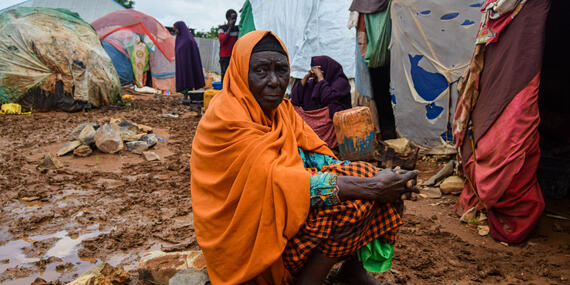Today's top news: Occupied Palestinian Territory, Somalia, Syria

Occupied Palestinian Territory
The humanitarian pause had lasted for seven days and enabled a major increase in the delivery of basic supplies into and across Gaza, primarily by the Egyptian and Palestinian Red Crescent Societies and UN agencies. However, as the UN Secretary-General told the Security Council this week, the level of aid remains completely inadequate to meet the needs.
Between 24 and 29 November, 630 metric tons of wheat flour were distributed to 224,000 people in the south, along with 63,000 blankets and mattresses. Cooking gas has entered daily from Egypt during this period and has been available at one distribution centre in the south, albeit in quantities well below demand.
Since the start of the pause until 29 November, approximately 4,850 metric tons of food, primarily wheat flour, rice and canned food; 1,700 metric tons of blankets and mattresses; 1,110 metric tons of bottled water; 148 metric tons of medical supplies; and 29,500 litres of fuel were delivered to the UN Relief and Works Agency’s shelters, hospitals and warehouses in northern Gaza. Some 88 per cent of this assistance was delivered by the Palestine Red Crescent Society, in coordination with the UN, and the remainder by UN agencies.
With the resumption of hostilities, we fear that the continuation of the uptick in the delivery of basic supplies into and across Gaza is now uncertain. We must have at least the same volume of fuel and other humanitarian goods enter Gaza that entered during the pause.
Somalia
The Humanitarian Coordinator, George Conway, together with the Government and the Somali NGO consortium, have jointly warned that the country is in the midst of a disaster, as devastating rains and floods are spreading.
Since October, some 2 million people have been affected by torrential rains, and flash and riverine floods. More than 750,000 people were displaced from their homes and nearly 100 people have been killed, mostly in South West, Galmudug, Puntland, Hirshabelle and Jubaland States, and Banadir region.
The continuing heavy rains and floods are expected to swamp at least 1.5 million hectares of farmland through December.
Authorities, communities and aid workers have reached some 820,000 affected people with life-saving assistance, but needs are rapidly rising as the flooding expands across the country.
Projections show that the heavy rains will continue in the coming weeks, which will sustain the flooding, especially along the low-lying Shabelle and Juba riverine areas.
The devastation comes as millions of Somalis continue to battle hunger and malnutrition, with an estimated 1.5 million children under age 5 facing acute malnutrition between August of this year and July 2024.
With one month to go until the year ends, and despite massive needs, the 2023 Humanitarian Response Plan – which seeks more than US$2.6 billion to meet the priority needs of 7.6 million people – is only 42 per cent funded, at $1 billion. Aid organizations cannot meet current and new needs without additional resources.
Syria
The Humanitarian Coordinator ad interim, Sudipto Mukerjee, expressed alarm over the current militarization of a water facility in Ebreha town, in Deir-ez-Zor Governorate.
Access to the water station has been severely restricted since 23 November due to the facility reportedly being used as a military outpost at night. The military use of the Ebreha water station prevents workers from operating or repairing it, depriving at least 45,000 people in the area of a safe drinking water source.
The Ebreha water plant and the water treatment it supplies need extensive maintenance and rehabilitation to be fully functional and operational, and for the water to be safe to drink. This will require technicians’ full, unfettered access to both plants.
Deir-ez-Zor Governorate has experienced a sharp rise in hostilities for several months. The violence has claimed multiple lives and displaced more than 25,000 people.
Mr. Mukerjee called on all parties to take all feasible precautions to protect civilian objects against attacks in accordance with international humanitarian law and international human rights law. This includes not using civilian objects for military purposes.
